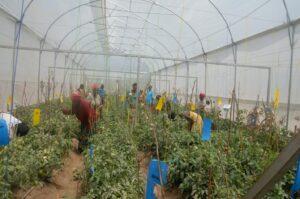As part of the project to combat the illegal donkey skin trade in West Africa, carried out in partnership with Brooke AO, INADES-Formation Côte d’Ivoire organized a week of social mobilization and awareness-raising against the illegal donkey trade in the Tengrela department in northern Côte d’Ivoire. The event took place from March 24 to 28, 2025.
Located in northern Côte d’Ivoire on the border with Mali, the Tengrela Department is one of the areas where the project to combat the illegal donkey trade in West Africa is being implemented.
In this region, it’s common to see donkeys roaming the streets, free or harnessed to carts, carrying women or children, wood, water containers or other goods.
The usefulness of donkeys in these northern villages and towns no longer needs to be demonstrated. Participants in the village talks held during the week of social mobilization against the illegal trade in donkey hides clearly affirmed the socio-economic importance of donkeys in their localities.

The latter are involved in field work, transporting goods and people, and are thus a precious help to rural households.
Talks, debates and mass awareness sessions were part of the week’s activities.
The nine talks and debates held in four villages – Papara, Tamania, Koulousson and Dougba – brought together community leaders, men, women, pupils and children in small groups to discuss the entry of donkeys into villages, their social, economic and cultural importance, and the need to protect them.
Mrs Konaté Péguéman, a donkey owner living in Dougba 2, says it’s impossible for her to do without a donkey: “I used to have two donkeys, but one died and the other got lost. I couldn’t go to the fields any more because walking made me tired. I had to look for money to buy a new donkey… I built him a shelter. Sometimes I lend it to other women who have also lost their donkeys.
In addition to the discussion forums, the social mobilization week was an opportunity to present the project to the region’s administrative and village authorities, starting with the Tengrela Sub-Prefect and the Regional and Departmental Directors, and to solicit their full contribution and collaboration to the project.

The highlight of the week was a mass awareness-raising session to launch the project in the region, which brought together the eight (8) villages benefiting from the project in Dougba 2 on March 28.
In the presence of the authorities, the population says no to the illegal donkey skin trade
The meeting was attended by the representative of the Sous-préfet, the Departmental Director of Mirah in Tengrela, Mr. Yao Sévérin, and delegations from the various villages mainly concerned by the project.
Introducing the project, Mr. Bamba Mamadou, Project Coordinator for Côte d’Ivoire, warned of the scale of the phenomenon: “more than 4 million donkeys are slaughtered every year just for gelatin”. The images of slaughtered donkeys presented by the presenter shocked the participants, who couldn’t help shouting cries of sorrow and pain: Kignon min! i.e. it’s awful, horrible!

An exclamation with which we all agree, which is why we must all put a stop to this barbaric trade in donkey skins.
Mr. Yao Severin, Departmental Director of MIRAH, recalled the urgent need for action and the measures taken by the State to combat this phenomenon.
“In Mali, he will say, in the years 2015 to 2016, it was 300 donkeys that were slaughtered every day; in Burkina over the same period we counted 19 tons of donkey skins exported. Then the traffickers moved on to Côte d’Ivoire…In October 2019, the Côte d’Ivoire government closed down a clandestine slaughterhouse discovered in Ouangolo, (Editor’s note: still in the north of the country)”.
The government of Côte d’Ivoire has gone further, passing a law banning the slaughter and export of donkeys. In conclusion, Mr. Yao invited the population to report buyers to their departments or to the sub-prefecture.
The representative of the Sous-Préfet expressed the latter’s commitment to supporting the project, before declaring the project launched in the Tengrela area.
At the end of the ceremony, participants unanimously called out “Kignon Min” to mark their commitment to putting an end to the illegal donkey trade in their villages.


The aim of the week of social mobilization was to raise awareness and mobilize the population, as well as the authorities, to put a stop to this horrible trade.
The project to combat the illegal donkey skin trade in West Africa, implemented by INADES-Formation in partnership with Brooke Afrique de l’Ouest, covers 3 countries: Côte d’Ivoire, Togo and Chad, and aims to contribute to the preservation of the donkey species in West Africa. It has two main lines of action:
- Strengthen regional advocacy on the illegal donkey skin trade in West Africa,
- Mobilize owners and users of draught horses to fight for the preservation of the asinine species.
Similar projects are being implemented within the INADES-Formation network, notably in Burkina Faso, Tanzania and Kenya.
Service Communication Secrétariat Général











